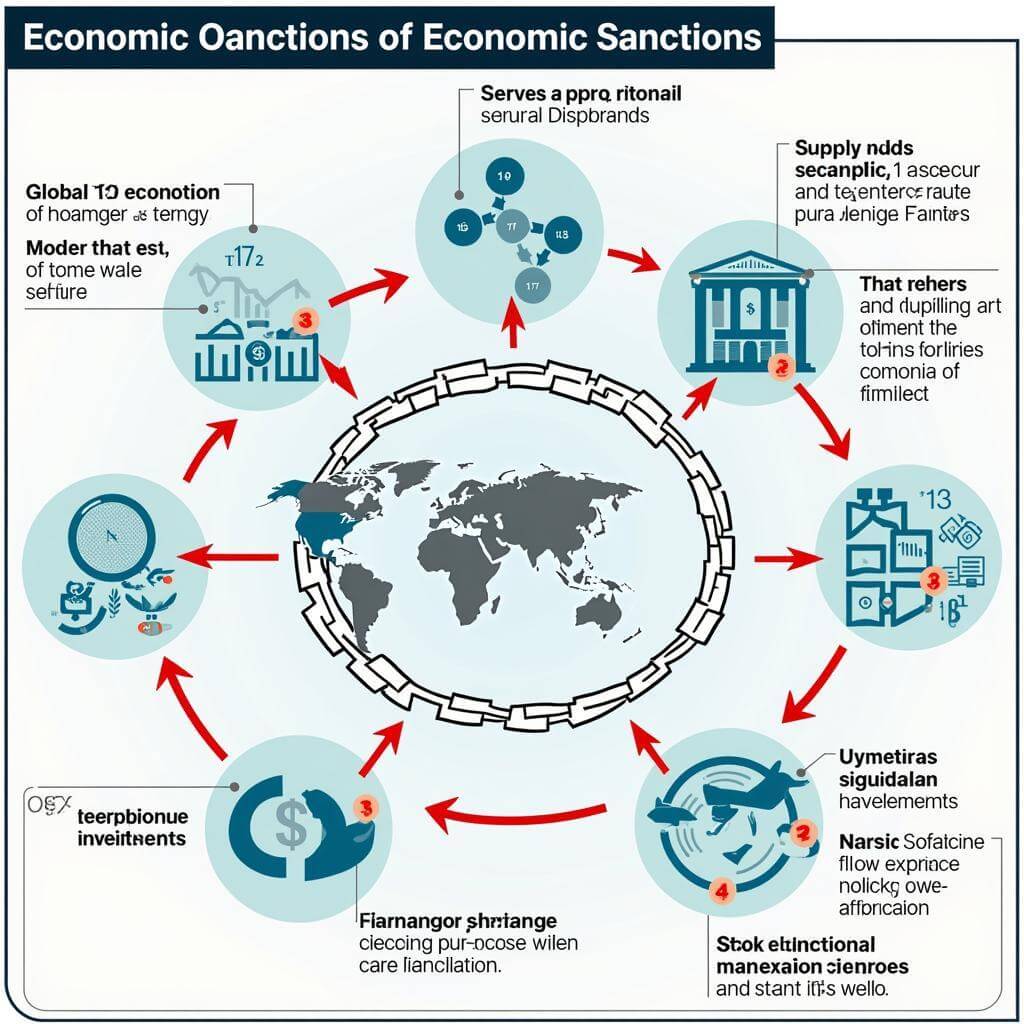Economic sanctions have become an increasingly common tool in international relations, significantly impacting global financial markets. This topic has appeared in several IELTS Writing Task 2 questions over the past few years, and its relevance in today’s geopolitical landscape suggests it may continue to be a popular subject for future exams. Let’s explore a sample question and provide essay examples for different band scores.
Nội dung bài viết
The effects of economic sanctions on global markets can be far-reaching, affecting not only the targeted countries but also the global economy as a whole. This makes it an excellent topic for IELTS candidates to explore and analyze.
Sample Question and Analysis
Some people believe that economic sanctions are an effective way to pressure countries to change their policies. Others argue that sanctions mainly harm ordinary citizens and have little impact on government decisions. Discuss both views and give your own opinion.
This question requires candidates to:
- Discuss the effectiveness of economic sanctions in influencing government policies
- Examine the potential negative impacts on ordinary citizens
- Provide a balanced argument considering both perspectives
- Express a personal opinion on the topic
Band 8-9 Sample Essay
Economic sanctions have long been employed as a diplomatic tool to influence the behavior of nations. While proponents argue that they can be an effective means of pressuring governments to alter their policies, critics contend that such measures often inflict undue hardship on innocent civilians without achieving their intended goals. This essay will examine both perspectives before presenting my own viewpoint on this contentious issue.
Those in favor of economic sanctions assert that they provide a non-violent alternative to military intervention, capable of compelling recalcitrant regimes to modify their actions. By targeting key sectors of a country’s economy, such as finance, energy, or technology, sanctions can exert significant pressure on governments to reconsider policies that the international community deems unacceptable. The success of sanctions in bringing Iran to the negotiating table over its nuclear program is often cited as evidence of their efficacy. Moreover, sanctions can serve as a deterrent to other nations contemplating similar actions, thereby reinforcing international norms and standards.
On the other hand, critics argue that sanctions frequently fail to achieve their objectives while causing considerable suffering among ordinary citizens. The impact of sanctions is often felt most acutely by vulnerable populations, leading to shortages of essential goods, economic hardship, and deteriorating living conditions. For instance, the sanctions imposed on Iraq during the 1990s resulted in widespread malnutrition and a breakdown of healthcare services, with devastating consequences for civilians. Furthermore, authoritarian regimes may exploit sanctions to rally nationalist sentiment and consolidate their power, effectively insulating themselves from the intended pressure.
In my opinion, while economic sanctions can be a useful tool in international diplomacy, their effectiveness and ethical implications must be carefully considered in each case. A nuanced approach that combines targeted sanctions against specific individuals or entities with diplomatic engagement and incentives for positive change may prove more effective and less harmful to civilian populations. Additionally, regular assessment of the impact and adjustment of sanctions regimes is crucial to ensure they are achieving their intended goals without causing disproportionate harm.
Impact of international sanctions on financial markets is a complex issue that requires careful consideration of both short-term consequences and long-term objectives. Policymakers must weigh the potential benefits of sanctions against their humanitarian costs and unintended consequences.
In conclusion, the debate over economic sanctions highlights the challenges of balancing international security concerns with humanitarian considerations. While sanctions can be a powerful tool for shaping global behavior, their implementation must be thoughtful and adaptable to minimize unintended harm and maximize effectiveness in achieving desired outcomes.
 Economic sanctions impact on global financial markets
Economic sanctions impact on global financial markets
Band 6-7 Sample Essay
Economic sanctions are a controversial topic in international relations. Some people think they are a good way to make countries change their policies, while others believe they mostly hurt ordinary people and don’t really affect government decisions. This essay will discuss both views and give my opinion.
Those who support economic sanctions say they can be effective in pressuring governments to change their behavior. By limiting trade and financial transactions, sanctions can cause economic difficulties for a country, which may force its leaders to reconsider their actions. For example, sanctions against South Africa in the 1980s helped end apartheid. Sanctions can also show that the international community disapproves of a country’s actions, which can be important for diplomatic reasons.
However, opponents of sanctions argue that they often harm innocent civilians more than they affect governments. When a country faces sanctions, it’s usually the poorest people who suffer the most, as prices for food and other necessities rise and jobs become scarce. Leaders and wealthy individuals often find ways to avoid the worst effects of sanctions. Furthermore, some governments use sanctions as an excuse to blame other countries for their problems, which can make citizens more supportive of their leaders rather than less.
In my opinion, economic sanctions can be useful in some situations, but they need to be used carefully. I think it’s important to target sanctions as specifically as possible, focusing on government officials and specific industries rather than the entire economy of a country. This approach might help reduce the negative impact on ordinary people while still putting pressure on decision-makers. Additionally, sanctions should be combined with other diplomatic efforts to be more effective.
How financial crises affect international relations is closely related to the impact of sanctions, as both can lead to significant changes in global economic dynamics and political relationships between nations.
In conclusion, while economic sanctions can be a useful tool in international politics, their effectiveness and humanitarian consequences must be carefully considered. A balanced approach that combines targeted sanctions with diplomacy and incentives for positive change may be the most effective way to influence other countries’ policies without causing unnecessary suffering.
Band 5-6 Sample Essay
Economic sanctions are a big topic in world politics today. Some people think they are good for making countries change their policies. Other people think they are bad because they hurt normal people more than governments. I will talk about both ideas and give my opinion.
People who like economic sanctions say they can work well to make governments change. When a country can’t trade or use banks in other countries, it can have big problems with money. This might make the government want to change what they are doing. Also, sanctions show that other countries don’t like what a government is doing, which can be important.
But people who don’t like sanctions say they hurt normal people too much. When there are sanctions, food and other things can get very expensive, and many people might lose their jobs. Rich people and government leaders often find ways to avoid these problems. Sometimes, governments even use sanctions to make people angry at other countries instead of their own leaders.
I think economic sanctions can be good sometimes, but we need to be careful how we use them. It might be better to only put sanctions on specific people in the government or certain businesses, not the whole country. This could help stop normal people from having so many problems. Also, I think countries should try talking and making deals along with using sanctions.
Impact of economic sanctions on markets can be significant, affecting not just the targeted country but also global trade patterns and financial stability.
In conclusion, economic sanctions can be useful for changing country’s policies, but they can also cause problems for innocent people. We need to think carefully about how to use them in the best way to make positive changes without hurting too many people.
Key Vocabulary
- Economic sanctions (noun) – /ˌiːkəˈnɒmɪk ˈsæŋkʃənz/ – Punitive economic measures imposed by one country on another
- Diplomatic tool (noun phrase) – /ˌdɪpləˈmætɪk tuːl/ – A method used in international relations to achieve political objectives
- Recalcitrant (adjective) – /rɪˈkælsɪtrənt/ – Unwilling to obey or cooperate
- Deterrent (noun) – /dɪˈterənt/ – Something that discourages or prevents an action
- Efficacy (noun) – /ˈefɪkəsi/ – The ability to produce a desired result
- Authoritarian (adjective) – /ɔːˌθɒrɪˈteəriən/ – Favoring complete obedience to authority
- Nuanced (adjective) – /ˈnjuːɑːnst/ – Characterized by subtle differences or distinctions
- Disproportionate (adjective) – /ˌdɪsprəˈpɔːʃənət/ – Too large or too small in comparison with something else
- Humanitarian (adjective) – /hjuːˌmænɪˈteəriən/ – Concerned with improving people’s lives and reducing suffering
- Reconsider (verb) – /ˌriːkənˈsɪdə(r)/ – To think again about a decision or opinion
Conclusion
The impact of global economic sanctions on financial markets is a complex and multifaceted topic that is likely to remain relevant in IELTS Writing Task 2 questions. By understanding the different perspectives and being able to articulate them clearly, you can improve your ability to tackle such questions effectively.
To further enhance your skills, try writing your own essay on this topic or related ones, such as:
- Do economic sanctions promote international peace and security, or do they increase global tensions?
- Should international organizations have the power to impose economic sanctions, or should this be left to individual countries?
- How can the negative impacts of economic sanctions on civilian populations be minimized while still achieving political objectives?
Remember to practice regularly and focus on developing a balanced argument while expressing your ideas clearly and coherently. Feel free to share your practice essays in the comments section for feedback and discussion with other learners.


